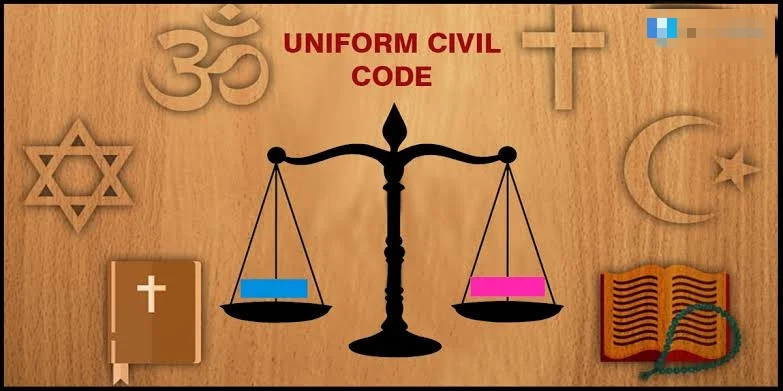What is Uniform Civil Code?
Uniform Civil Code is. Thus, the UCC is against the fundamental rights of the Constitution. However, even today, it is becoming necessary for so many years.
The Uniform Civil Code is a secular law, after the implementation of which the personal laws of all religions will cease to exist. At present Hindu, Muslim, Christian and Parsi communities have different religious laws. Hindu law also applies to followers of Buddhism, Jainism and Sikhism.
Sardar Vallabhbhai Patel headed the Committee on Fundamental Rights in the Constituent Assembly. That committee refused to hold them under fundamental rights. The biggest reason was that India is a country of diversity. But in the last few years, the discussion of Uniform Civil Code has been going on. Some are in favor of it and some people are against it. So let's know what this UCC i.e.
Uniform Civil Code is. Thus, the UCC is against the fundamental rights of the Constitution. However, even today, it is becoming necessary for so many years. It is not that only Muslims are opposing the Uniform Civil Code. Tribals of Nagaland have their own customs. Their marriage, their adoption, all these things are done according to their customs. Similarly, there are many communities in India, especially in North East India, who are allowed to practice their own customs and manners. Those people are opposing this UCC.
The right to freedom of religion is a fundamental right. If fundamental rights and policy directive principles are compared, fundamental rights are at a much higher level. If you restrict someone's religious activities, it will be a violation of fundamental rights in every way. Being against a fundamental right, it would be against the basic structure of the Constitution.
Right-wing groups in the country have always demanded that the Uniform Civil Code (UCC) be implemented in the country. People do not want to go away from their religious laws that is why no government has dared to enforce them. Which is now becoming the main agenda of the BJP government. Now, like Article 370, triple talaq and Ram Mandir, this is also becoming a priority of the BJP government.
Part 4 of the Indian Constitution contains the 'Directive Principles of State Policy'. Article 44 of the Constitution says that there shall be a uniform civil code for citizens. Article 44 says, 'The State shall endeavor to secure a uniform civil code for citizens throughout the territory of India.'
What is Uniform Civil Code?
The Uniform Civil Code is a secular law, after the implementation of which the personal laws of all religions will cease to exist. At present Hindu, Muslim, Christian and Parsi communities have different religious laws. Hindu law also applies to followers of Buddhism, Jainism and Sikhism. These laws have to be followed on subjects like marriage and property. The rules regarding divorce and subsequent maintenance are also determined by personal law. In such a situation if the Uniform Civil Code is implemented then all these personal laws will come to an end and the citizens will have to insist on uniform civil code.
According to the advocate, 'Men have more rights regarding divorce in Islam. Women's rights are very limited. Age of puberty and marriage rules in Islam are different from other religions. If the Uniform Civil Code comes into force, everyone will have to follow the same laws regarding marriage-land-property and wills. Currently, religions have different laws according to which court cases are conducted. If the Uniform Civil Code comes into force, personal law will be abolished.
Why are governments afraid to implement a uniform civil code?
Implementing a Uniform Civil Code is not easy. The reason behind it is politics. Religious organizations are standing against it. Hindu organizations have surrendered their personal laws. Whenever a uniform civil code is discussed, Islamic organizations stand against it.
Sharia Law and the Uniform Civil Code
Muslim society is very strict about Sharia law. This is the reason why Islamic organizations oppose it more. The country is witnessing violent protests over the Citizenship Act and NRC. The government is afraid of protests. The people of the country have not yet forgotten the violent protests against the Citizenship Amendment Act (CAA). Religious organizations see this as an attack on personal law. Governments do not touch this issue only to avoid this uproar.
Which states are considering Uniform Civil Code?
Uniform Civil Code is applicable in Goa. Recently, the Gujarat government has constituted a committee for Uniform Civil Code. The Assam government is considering implementing it. Uniform Civil Code has been drafted in Uttarakhand. A uniform civil code is under consideration in Karnataka, Madhya Pradesh and Uttar Pradesh.
ગુજરાતીમા વાંચવા માટે અહીં ક્લિક કરો
Applicable in which countries
Israel, Japan, France and Russia have common civil codes. European countries and America have secular laws, which apply equally to all citizens regardless of their religion. In Islamic countries, there is a uniform law based on Sharia that applies to all individuals regardless of their religion.














0 Comments